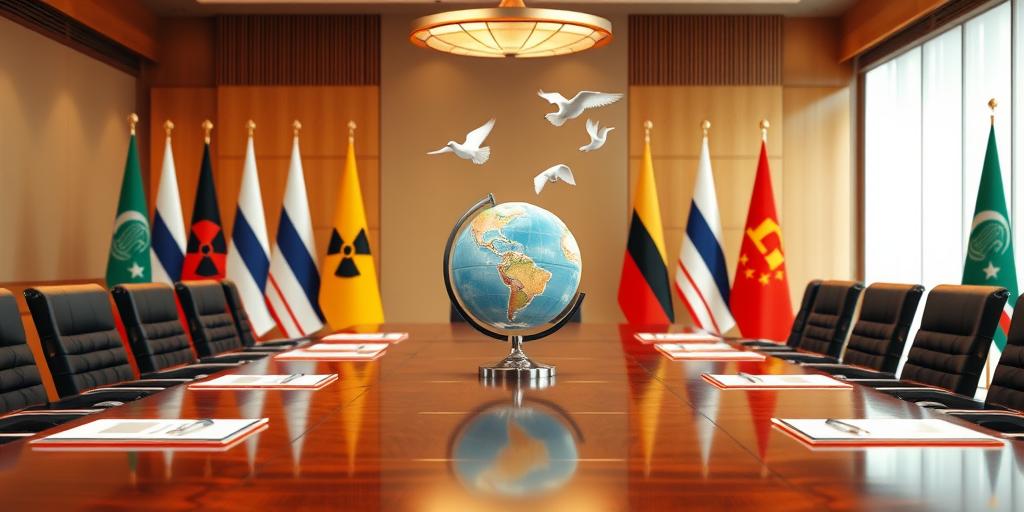Diplomacy and the Pursuit of Nuclear Disarmament
The threat of nuclear weapons looms large in international relations, casting a long shadow over global peace and security. Nuclear disarmament, the process of reducing or eliminating nuclear weapons, is a complex and multifaceted challenge that requires sustained diplomatic efforts, international cooperation, and a commitment to verifiable arms control agreements. This article explores the role of diplomacy in pursuing nuclear disarmament, examining the key strategies, challenges, and achievements in this critical endeavor.
The Role of Diplomacy in Nuclear Disarmament
Diplomacy is the primary tool for managing and mitigating the risks associated with nuclear weapons. It provides a platform for states to engage in dialogue, negotiate treaties, and establish mechanisms for arms control and verification. Effective diplomacy in the context of nuclear disarmament involves:
- Negotiation: Negotiating legally binding agreements that commit states to reduce or eliminate their nuclear arsenals.
- Verification: Establishing robust verification mechanisms to ensure compliance with disarmament treaties.
- Confidence-Building: Implementing measures to enhance trust and transparency among states, reducing the risk of miscalculation or escalation.
- Multilateral Cooperation: Fostering cooperation among states, international organizations, and civil society to promote nuclear disarmament norms and initiatives.
- Crisis Management: Utilizing diplomatic channels to manage and de-escalate crises that could potentially lead to nuclear use.
Key Strategies for Nuclear Disarmament
Several strategies have been employed in the pursuit of nuclear disarmament, each with its own strengths and limitations:
- Bilateral Agreements: Agreements between two states, typically the United States and Russia, to reduce their nuclear arsenals. The Strategic Arms Reduction Treaty (START) is a prime example of a successful bilateral agreement.
- Multilateral Treaties: Agreements involving multiple states, such as the Treaty on the Non-Proliferation of Nuclear Weapons (NPT), which aims to prevent the spread of nuclear weapons and promote disarmament.
- Arms Control Regimes: Establishing international norms and standards to regulate the production, testing, and deployment of nuclear weapons.
- Disarmament Initiatives: Voluntary actions taken by states to reduce their nuclear arsenals or eliminate certain types of nuclear weapons.
Challenges to Nuclear Disarmament
Despite significant progress in reducing nuclear arsenals since the end of the Cold War, numerous challenges remain:
- Lack of Trust: Deep-seated mistrust among states, particularly those with nuclear weapons, hinders progress on disarmament.
- Security Concerns: States may be reluctant to disarm if they perceive nuclear weapons as essential for their national security.
- Technological Advances: New weapons technologies, such as hypersonic missiles and autonomous weapons systems, pose new challenges for arms control and disarmament.
- Geopolitical Tensions: Regional conflicts and geopolitical rivalries can undermine efforts to promote nuclear disarmament.
- Verification Difficulties: Verifying compliance with disarmament agreements can be technically and politically challenging.
Achievements in Nuclear Disarmament
Despite the challenges, significant achievements have been made in nuclear disarmament:
- Significant Reductions in Nuclear Arsenals: The global stockpile of nuclear weapons has been reduced significantly since the end of the Cold War.
- The NPT: The Treaty on the Non-Proliferation of Nuclear Weapons (NPT) has been largely successful in preventing the spread of nuclear weapons.
- Arms Control Agreements: Numerous arms control agreements, such as the START treaty, have contributed to reducing the risk of nuclear war.
- Increased Awareness: Increased public awareness of the dangers of nuclear weapons has led to greater support for disarmament efforts.
Conclusion
Diplomacy plays a crucial role in the pursuit of nuclear disarmament. By fostering dialogue, negotiating agreements, and building trust among states, diplomacy can help to reduce the threat of nuclear war and create a safer, more secure world. While challenges remain, the achievements in nuclear disarmament demonstrate that progress is possible through sustained diplomatic efforts and international cooperation. Continued commitment to diplomacy and arms control is essential to achieving the ultimate goal of a world free of nuclear weapons.









